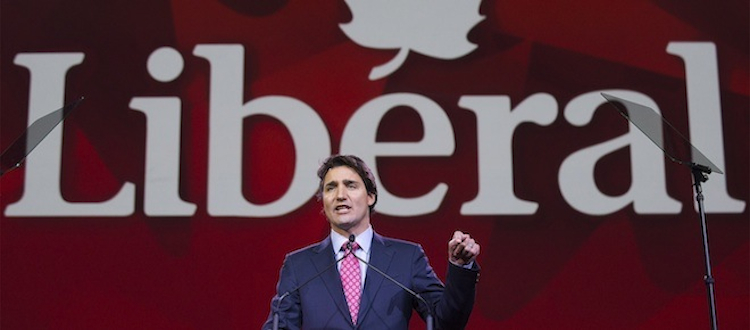After Trudeau’s warning, a look at income trends
How has the middle class fared?
Federal Liberal leader Justin Trudeau delivers his closing address to delegates on day three of the party’s biennial convention in Montreal, Saturday, February 22, 2014. THE CANADIAN PRESS/Graham Hughes
Share

Much has been written about how the middle class is faring economically in Canada, and there will be plenty more as Justin Trudeau and his ascendant Liberals make this their core policy theme in the long ramp-up to a 2015 election.
The way Trudeau framed the issue in his speech to Liberals at their convention in Montréal last weekend was particularly grave, as he warned of a kind of class strife if the middle class doesn’t begin to benefit from the economic orthodoxy of our times:
“And to wealthier Canadians, I say this: the growth we have seen over the past three decades has been the product of a broadly supported agenda. Investments in education, fiscal discipline, openness to trade. All of which the middle class voted for, repeatedly. Here’s the point: The original promise of that agenda was that everyone would share in the prosperity that it creates. It hasn’t happened. That’s not a political point. It’s a fact. And if we don’t fix that, the middle class will stop supporting a growth agenda.”
If I heard him right, Trudeau was telling the rich that less prosperous Canadians won’t much longer support bedrock policies—notably free trade, the great economic mission of the 1980s, and spending restraint, the preoccupation of the 1990s—if they don’t start seeing a piece of the action.
So I went back to the stats. Thinking specifically of Trudeau’s reference to “fiscal discipline,” I wondered about the era of balanced budgets. Jean Chrétien and Paul Martin eliminated the federal deficit in 1998 (until the 2009 recession forced their Tory successors in power to temporarily plunge back deep into red ink).
So what has happened since that watershed year? According to Statistics Canada data, the average two-earner family with children made $93,700, after taxes, in 2011, up from $71,400 in 1998. That’s an inflation-adjusted, after-tax raise of 31 per cent. Not bad. But was that a fair share of a growing economy? Perhaps just a shade light: Canada’s gross domestic product grew 37 per cent from 1998 to 2011.
Here’s that data, represented in a chart:
We might wonder how more vulnerable households have held up. The same Statistics Canada data shows, for example, that single-parent families led by a female saw their average earnings rise to $43,000 in 2011 from $31,500 in 1998, up about 37 per cent. Again, that’s adjusted for inflation and after taxes, so it’s what those moms really have to spend or save.
I don’t claim that these numbers tell the whole, complicated story. There are many ways to slice and dice income figures, and the real experiences of Canadians vary widely depending on factors like where they live, how old they are, what sort of education they have, and more. (Real experts have hashed this out in more detail here.)
But I do think that a straightforward reading of income trends does not support the notion that it’s somehow an indisputable “fact” that middle-class families in Canada have been denied the benefits of the smart economic decisions of recent times—let alone that their situation is so dire that they might be near the point of revolting against those policies.
UPDATE: I’ve been taken to task for using average rather than median income figures. For this debate, I don’t think it makes all that much difference. But for those interested: median after-tax income for a two-earner family with children rose to $83,600 in 2011 from $65,700 in 1998, or 27 per cent. In the same period, the median after-tax income of unattached individuals rose 22 per cent, to $25,800 from $21,100. (All this according to Statistics Canada data in the CANSIM 202-0605 tables, for those doing their own digging.)